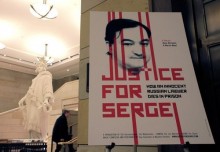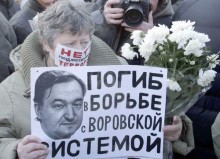The period of failed “reset” of relations between Russia and the United States gave way to the war of lists, which began in the mid April. On April 12 US media published the “Magnitsky List.” This is the introduction of visa and economic sanctions against 18 Russian people, who have been implicated in human rights violations by the United States. The next day, Russia responded with a list of its own that includes 18 US citizens.
Press Secretary of the Russian President Dmitry Peskov called the actions of the Obama’s Administration a direct interference in the internal affairs of Russia and said that the death of the attorney should not be discussed outside the country. “Magnitsky case should not be discussed outside of Russia, it is unacceptable for us and we will never agree with this,” said Peskov in the TV show “Sunday Night” with Vladimir Solovyov. Peskov called it a “blow to Russia-US bilateral relations as a whole.”
Meanwhile, the Speaker of the State Duma Sergei Naryshkin called Magnitsky List a model of illegal document. At the same time, Naryshkin urged people “not to panic” because of the adoption of this document and maintain partnership relations between Russia and the United States on strategic issues. State Duma Speaker stressed that Magnitsky List is a challenge and Russian authorities gave a symmetric response to it.
Observers note that in none of the two lists there are high-ranking representatives of the current administrations, but in the American press there have been the reports about another closed Magnitsky List that allegedly includes, in particular, the head of Chechnya Ramzan Kadyrov. Individuals listed in the document issued by the Ministry of Finance will be denied entry into the United States and their assets will be frozen in accordance with the Magnitsky Act, passed by the Congress last year. The list includes officials involved in the investigation of Magnitsky case – investigators Pavel Karpov and Oleg Silchenko, judges of the Tver Court who took the decision to extend the arrest – Aleksei Krivoruchko and Elena Stashina, as well as former Chief of “Butyrka” Jail Dmitry Komnov. In the list of 18 people 16 are directly related to the Magnitsky case and the two others are the key figures of high-profile court cases.
The influential senator of the US Republican Party John McCain urged the US Congress and the US State Department to put more names of Russian officials suspected of human rights violations on the Magnitsky List. After reading both the list, previously released by the US Ministry of Finance, and the confidential list drawn up by the State Department, senator called them “insufficient.” RBK quoted McCain: “I am deeply disappointed that the administration has made a list of only 18 names. At the time when the rights of Russian citizens are systematically violated, United States has the responsibility to demonstrate to our friends in Russia that the perpetrators of human rights abuses will be held accountable. Therefore, the active implementation of the Magnitsky Act is so important and that is why the list, published today, does not fully correspond with our task.”
EXPERTS’ OPINION
THESE ARE SIMPLY ACTS OF POLITICAL DIVISION
Semen NOVOPRUDSKY, independent journalist, Moscow:
 “The emergence of Magnitsky List is a very important event in history, and the anti-Magnitsky law is only a consequence. Magnitsky Act was passed in the United States at the time when the country is ruled by, probably, the least focused on world domination and most toothless in foreign policy of the US administration in a long while. The fact that this list was adopted was an obvious reaction of the US political establishment to the events that took place in Russia. That means that the United States no longer have illusions about the fact that Russia can become a democratic country first with the help of the West and then without it. In a sense, it was recognition of the fact that Russia still remains the country with different core values. And in fact this war of lists is not another ‘cold war’ yet. However, it might be very close because Russia still cannot compete with the US and be a great geopolitical player and an enemy the way it did in the times of the Soviet Union. This, of course, is recognition of the fact that Russia has not become a part of the Western world and will not become one in the foreseeable future.
“The emergence of Magnitsky List is a very important event in history, and the anti-Magnitsky law is only a consequence. Magnitsky Act was passed in the United States at the time when the country is ruled by, probably, the least focused on world domination and most toothless in foreign policy of the US administration in a long while. The fact that this list was adopted was an obvious reaction of the US political establishment to the events that took place in Russia. That means that the United States no longer have illusions about the fact that Russia can become a democratic country first with the help of the West and then without it. In a sense, it was recognition of the fact that Russia still remains the country with different core values. And in fact this war of lists is not another ‘cold war’ yet. However, it might be very close because Russia still cannot compete with the US and be a great geopolitical player and an enemy the way it did in the times of the Soviet Union. This, of course, is recognition of the fact that Russia has not become a part of the Western world and will not become one in the foreseeable future.
“I think it is very unlikely that the two leaders will not meet ever again under any circumstances. Of course, the contacts at the level of Foreign Ministers will be maintained. It is also clear that, roughly speaking, with these lists the US and Russia demonstrate that these two countries are in fundamentally different political camps and in the near future will not become strategic allies. In fact, these are simply acts of political division.”
THIS INCIDENT IS A PROOF OF INABILITY OF BOTH COUNTRIES TO LIVE IN THE 21st CENTURY
Lilia SHEVTSOVA, senior researcher at the Moscow Carnegie Center:
 “The situation we are witnessing now that can be called ‘Magnitsky War’ in the relations between Russia and America, is a historical and political incident. And the reason for this incident is the inability of both countries to solve problems of the 20th century in the 21st century.”
“The situation we are witnessing now that can be called ‘Magnitsky War’ in the relations between Russia and America, is a historical and political incident. And the reason for this incident is the inability of both countries to solve problems of the 20th century in the 21st century.”
What do you mean by saying this?
“On the one hand, it is an attempt of Putin’s Kremlin to return to the Soviet formula of existence due to confrontation with another civilization, the search for an enemy and appointing the United States of America to the role of the enemy, in order for the Russian civilization to survive. On the other hand, it is the evidence of inability and unwillingness of the US political circles to find the answers to the new Soviet formula, to which Putin appeals. Here is what this incident is all about. The Kremlin wants, on the one hand, to go back to the past but, at the same time, Putin and his team do not want a confrontation with the United States, they want to work together but on terms that they dictate. At the same time in Washington we can see two conflicting aspirations. The legislature – senators in Congress want America to go back to some normative assessments of its foreign policy. While the executive branch – President’s Administration, the White House is not ready to use value-based approach. The result of this is the names of 18 people in the US Magnitsky List that do not mean anything.”
What will this incident lead to?
“This incident can only lead to another case of schizophrenia in relations between Russia and the US that hang in the air, that have no serious economic or any other solid base, and that are based on situational transactions. And any of these transactions is temporary and thus does not satisfy either of the sides. Obviously it will last for a long time, until, at least Russia finds the way out of the 20th century and until America finds its way back to strategic normative assessments in foreign policy.”
How long will it last? For as long as Putin is in power?
“I do not believe that Magnitsky phenomenon in one form or another will disappear or will be eliminated even with the departure of Putin. Putin’s place might be taken by any other person, who would work according to the same Soviet model. Therefore, we can be certain that Magnitsky phenomenon will be over only when Russia will find another formula for existence not through myths and stereotypes of the past and the confrontation with the West. So far, at least we do not see any political alternative, power or model, or leaders, who can offer Russia such model. However, there is awareness of this need in the Russian elite and society because people, for the most part, are looking at these verbal exercises of Peskov, Putin, and others, as well as at the whole situation with Magnitsky List with annoyance. But so far Russia has not yet found a different formula for survival. And the United States, as we see on the example of Obama’s Administration, is not ready to find a more effective strategic response to the Russian challenge. Therefore, we’ll continue to flutter in this substance in the near future.”
What can you say about the role of Europe, will it be able to find a way to give a strategic response to the Russian challenge?
“I, in fact, must agree with Zbigniew Brzezinski’s idea of Europe, when he repeatedly and namely in his latest book called Europe a home for retirees. Europe, not in the view of the crisis but due to the imperfect mechanisms of foreign policy, has no single concept with regard to Russia. And policies of individual states, which represent the core of Europe is largely based on simulation and connivance. Although, at the same time, we must recognize that public opinion in Germany, Great Britain, France, and other countries strongly demands from their executive authorities to search for new approaches to Putin’s Russia.”









